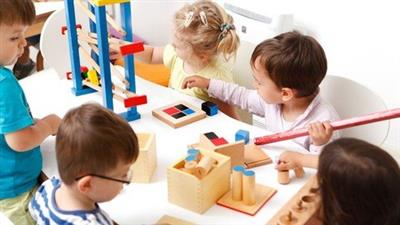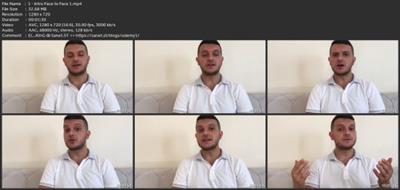Play At Early Childhood
Published 10/2022
MP4 | Video: h264, 1280x720 | Audio: AAC, 44.1 KHz
Language: English | Size: 1.44 GB | Duration: 2h 5m
Play at Early Childhood by Supervised PhD Psychologist Ilbey UCAR
What you'll learn
Play in Early Childhood
Definition of Play
Importance of Play
Features of Play
History of Play
Opinions and Theories of Play in the History
Theories of Play
Traditional Theories
Modern Theories
Classification of Play by Age and Features
Types of Play
The Effect of Play on Early Childhood Developmental Periods
Play in Preschool Period
Factors Affecting Play Behavior in Preschool Period
Social Problem Solving Skills and Play Behaviors in Preschool Period
Teaching Play
Planning the Play
Implementation of the Play
Evaluation of Play Activities
Teaching with Play-based Activities
Advantages of Play-based Activities
Disadvantages of Play-Based Activities
Teaching Mathematic with Play Based Activities
Teaching Social Skills with Play Based Activities
Digital Play
Factors Affecting Digital Gaming Habit
Age
Gender
Parents
Effects of Digital Games on Children
Advantages of Digital Games
Disadvantages of Digital Games
Requirements
No
Description
Definition of PlayPlay is an activity that continues throughout a person's life and begins with birth. Childhood is a period in which the world of imagination is often at the forefront, and the child begins to get to know himself, his environment and life. For this reason, the concepts of childhood and play are two factors that complement each other. Theorists, researchers and educators such as Freud, Piaget, Vygotsky, Erikson, who try to express what play means and why children play games, argue that play has a great role in development and learning, and that play includes health, pleasure and creativity. Play is an important activity where the child explains himself, discovers what he can do, uses his imagination and develops various abilities. Play is every child's job. One of the most important methods for the healthy development and education of children in terms of physical, cognitive and social aspects is definitely play. Children learn about their life experiences through play. He tries to make sense of the world with his own emotions by taking on different tasks during the game. Therefore, play is vital for the development of the child. Play, which constitutes the basic word of the children's world, is an extremely complex subject. It is an event that focuses a whole on one point and carries with it very different ideas and experiences.Different definitions and explanations have been made for the game, such as throwing away excess energy, relaxation, basic needs, imitation, and ensuring the saturation of internal control. Today, it has been seen that there are many different sizes. Games are informative and enjoyable activities that do not have time and place restrictions. The game is the most important learning process that the child enjoys while playing, therefore participates in the game voluntarily, advances all his/her developmental areas, has a certain rule or not, is a part of real life. Play is a very complex phenomenon that includes different ideas and experiences and is based on the child's own imagination. The game can also be expressed as a source of happiness, which has many gains such as learning, gaining experience together, communicating, creating, and preparing for adulthood, a way of conveying emotions, relaxation and freedom. The fact that the concept of play, which is an indispensable lifestyle for the child, is handled with very different and various definitions reveals how important and inclusive the concept of play is. Play life for the child is a way of learning because the child learns, has fun, expresses himself and relaxes by playing. In every place where the child exists, there is also a game with him. Although the types of games, the ways and rules of playing, the tools and equipment used in the games differ from society to society and over time, their games continue to exist together with children.İmportance of PlayThe play has shown itself in the fields of education and development in every time and place where people exist. Play activities, which are active with the birth of children and differ in form and content step by step, are a tool that develops and reinforces certain abilities that children participate in without getting bored. Children sometimes give clues about their social, mental, and physical developmental stage with their movements and attitudes while playing on their own and sometimes with other peers. The child's personality begins to be stereotyped and deepened in the game, his skills are revealed in the game, he learns about life experiences mostly in the game. The child thinks, moves, makes plans in the game, and while expressing these by speaking, he also shows it to the outside with his movements or attitudes. Play is the easiest, most meaningful, and direct way for the child to express himself. An adult can best interact with a child through play. The child can show his happiness and excitement through play, which he cannot express clearly. Children have the opportunity to know and understand their bodies through play. They also need to play in order to express their emotions, throw away excess energy, develop their skills, solve problems, understand others' feelings and their own characteristics, and learn to interact with others. For this reason, the concept of play, which includes all these positive features for children, is a very important and worth investigating subject. It should not be forgotten that it is very important not only for children, but also for child-adult communication.
Overview
Section 1: Introduction
Lecture 1 Intro Face to Face 1
Lecture 2 Intro Face to Face 2
Lecture 3 Introduction about Play
Lecture 4 Theories And Opinions Of Play
Lecture 5 Classification Of Play By Age And Features
Lecture 6 The Effect Of Play On Early Childhood Developmental
Lecture 7 Play In Preschool Period
Lecture 8 Teaching Play In Preschool
Lecture 9 Teaching With Play Based Activities
Lecture 10 Digital Games
Preschool Teachers,Preschool Program Developers,Parents,Child Psychologists,School Counselors,Psychologist
Download link
rapidgator.net:
[uploadgig.com:Kod:https://rapidgator.net/file/7ef8b6859d6c33df2172ef144bf2551c/psnkt.Play.At.Early.Childhood.part1.rar.html https://rapidgator.net/file/327d18baa2e3aa51908596dc1a7c529b/psnkt.Play.At.Early.Childhood.part2.rar.html [
[nitroflare.com:Kod:https://uploadgig.com/file/download/1F08302e08bc2455/psnkt.Play.At.Early.Childhood.part1.rar https://uploadgig.com/file/download/aF53910ced5cefc1/psnkt.Play.At.Early.Childhood.part2.rar [
[1dl.net:Kod:https://nitroflare.com/view/15A8E5B7CF4D5D8/psnkt.Play.At.Early.Childhood.part1.rar https://nitroflare.com/view/FDEF3CC43EEB967/psnkt.Play.At.Early.Childhood.part2.rar [
[Kod:https://1dl.net/z92w2zd0psou/psnkt.Play.At.Early.Childhood.part1.rar.html https://1dl.net/nbxeufsy4y4i/psnkt.Play.At.Early.Childhood.part2.rar.html[
1 sonuçtan 1 ile 1 arası
Konu: Play At Early Childhood
-
26.10.2022 #1Üye



- Üyelik tarihi
- 20.08.2016
- Mesajlar
- 144.947
- Konular
- 0
- Bölümü
- Bilgisayar
- Cinsiyet
- Kadın
- Tecrübe Puanı
- 153
Play At Early Childhood
Konu Bilgileri
Users Browsing this Thread
Şu an 1 kullanıcı var. (0 üye ve 1 konuk)



 LinkBack URL
LinkBack URL About LinkBacks
About LinkBacks






 Alıntı
Alıntı
Konuyu Favori Sayfanıza Ekleyin